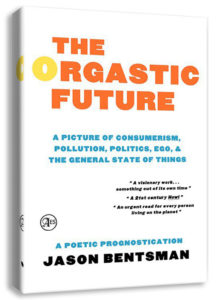i.
Jason: [status] Thinks facebook is jumping the shark
Michelle: Or . . . maybe the shark is jumping facebook?
Jason: You make a very good point. Never thought of it that way. All this time it was staring me right in the face. To think! Four years of research down the drain. Only the little-minded are scared of the obvious. I’ve been fooling myself. Don’t have the mettle I once thought. A two-bit hack, at best, an armchair philosopher. You’ve disabused me of this 800 pound elephant under the cocktail cabinet. I’m beside myself. There, I’m drinking a bitter and sweet cocktail of my own joy and grief. I have always depended on the kindness of strangers.
Michelle: I’m glad you’ve come to your senses. I recommend a good year or two of marine biology work so you don’t make the same sort of mistake again.
Jason: [status] realizes that perhaps the shark is jumping facebook (!?)
ii.
Michelle: [status] Has a new appreciation for the saying ‘let sleeping dogs lie.’
Jason: I’ve found newly-awoken dogs the most wonderful companions. We really do seem to have a fundamentally opposing philosophical worldview. But, in this case, I firmly believe I’m right. I recall the famous ten year correspondence between Kierkegaard and Heidegger— all the more amazing because Heidegger was born thirty-some years after Kierkegaard’s death— on the nature of pickled herring, in which Kierkegaard clearly emerged the victor… By the way, I have enrolled in marine biology classes at John Hopkins with the young Cousteau. We shall see about this shark.
Michelle: The Harvard chemists might concede your point, but the physicists would surely protest. The herring would be a particular bone of contention. While the Heidegger/Kierkegaard correspondence is relevant, it fails to settle the matter since it does not specifically address the issue of the sleeping dog. Nonetheless, I’m intrigued and will look into this further. I have the feeling that you may be on to something. You may also want to discuss the matter with Cousteau to discover his opinion, which is surely more expert than my own.
Michelle: [status] Is jumping facebook.
iii.
[Status] Jason took the “IQ test” quiz and the result is: Very Good!!
Michelle: Was the IQ test performed by a phrenologist?
Jason: I don’t know what that is.
I like Guns n’ Roses more than perhaps I should. Have a strange fondness for and identification with Axl Rose. And, more subconsciously than not, was awaiting this album for over a decade, increasingly skeptical it would ever be released. So when it actually was, I felt compelled to write a review. Clearly, this review is miscategorized. I have no intention of rating more music, so I include it here.
Key:
[ X ] – don’t like
[ ~ ] – okay
[ * ] – like
1. Chinese Democracy ~
2. Shackler’s Revenge ~
3. Better ~/*
4. Street of Dreams *
5. If the World *
6. There Was a Time *
7. Catcher in the Rye * – the first two-thirds of the song is decent, the last third good
8. Scraped ~
9. Riad n’ the Bedouins X
10. Sorry ~
11. IRS ~
12. Madagascar * – the middle section containing voiceovers, a patchwork dialogue or de facto poem, is far too long musically, but from a literary perspective probably contains the most poignant lyrics on the album
13. This I Love * – horribly maudlin, yet a catchy melody, and surprisingly poignant
14. Prostitute X/~
Overall technique/style: B+/A- (would be higher if the album weren’t so overproduced)
Overall substance/poignancy: B-/B
Lyrics: neutral to poor
Overall grade: B+
Final thoughts: In spite of how overproduced and convoluted this album is, there is something of the obsessive, daemonic, and genius in it that somehow prevents the flaws from being utterly unworkable, and even uses some of them to the album’s advantage. Does the album bear repeated listens? Yes. One can listen to it periodically year after year, and this is a hallmark of ‘art.’ It likely would have done better commercially if it had been split into two cds— ‘Official Album’ (best songs), and ‘B Sides’ (weaker songs)— and if a good song drawing directly on Guns n’ Roses fans’ pent up nostalgia, for instance, There Was a Time, had been released as the first single rather than the mediocre and incongruous Chinese Democracy.
A party.
Man 1. What do you do?
Man 2. I work at a café.
Man 1. But what do you really do?
Man 2. What do you mean?
Man 1. I mean, what is your thing? Are you an actor?
Man 2. No. I just work at a café.
Man 1. You mean— that’s all you do?
Man 2. Yes.
Man 1. And that’s all you want to do?
Man 2. Yes.
Man 1. Huh. [whispering to himself] Just work at a café… I see… Interesting… Just
work at a cafe. [pause] Hey everyone! Come here! You have to meet this guy. He
works at a cafe— and that’s all he wants to do.
Man 3. What do you mean?
Man 1. He says he’s happy “just working at a cafe.”
Man 3. Just working at a cafe? What else does he do?
Man 1. No, you see, that’s the thing. I asked him that already. He’s says he’s happy “just
working at a cafe.”
Woman 1. What are you guys talking about?
Man 3. This guy here, he says he works at a cafe— and that’s all he wants to do.
Woman 1. Philip, really.
Man 3. No. I’m serious.
Woman 1. Philip.
Man 3. No, really. Ask him yourself.
Woman 1. [To Man 2] Is that right? Is that all you want to do— just work at a cafe?




Recent Comments